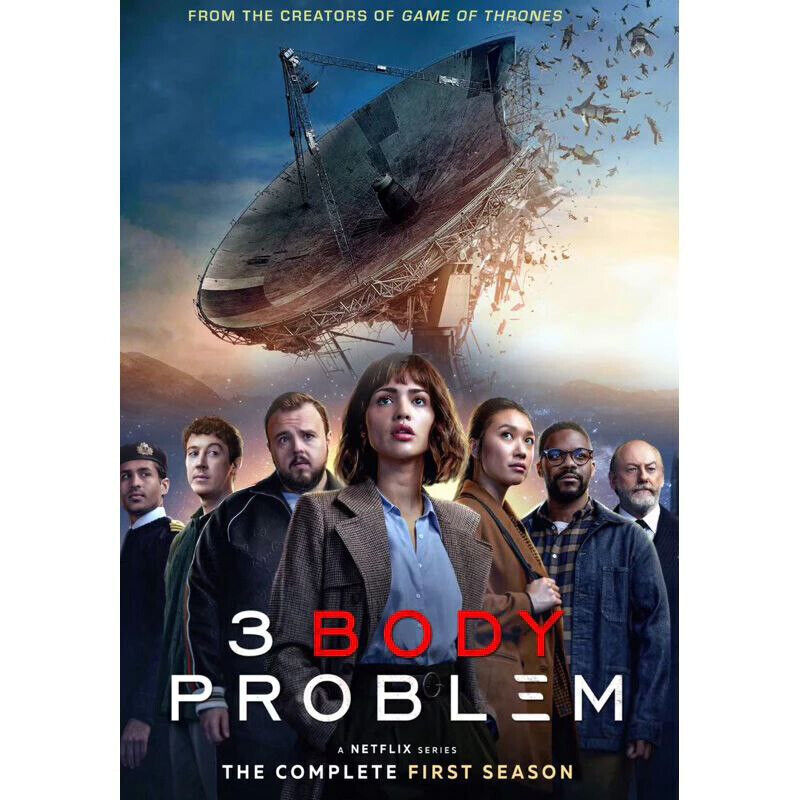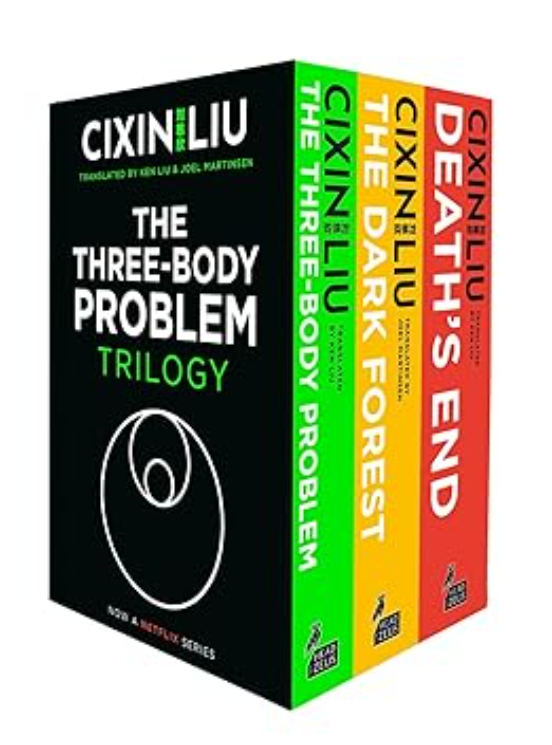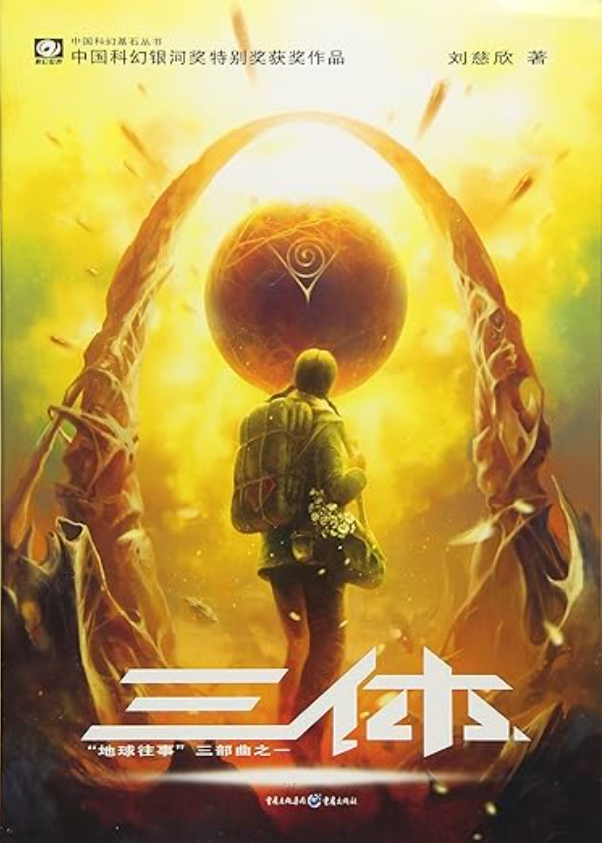Netflix’s #1 TV series, “3 Body Problem” has really upset the Chinese people, and for good reason. Here’s why.
Video reading and discussion,
https://www.brighteon.com/efbb6b22-3f6c-4e54-953a-3058a57341ff
Audio podcast,
Here is the transcript of me reading, commenting and adding to the article below, starting with the movie poster,
This is Jeff J. Brown China Rising Radio Sinoland and the founder of Seek Truth from Facts Foundation. Greetings from Shenzhen and our $12-a-night hotel room. When you know Chinese, you can find really good deals here. And it’s a nice room too. Anyway, this one is entitled Netflix’s number one TV series “Three-Body Problem” which has really upset the Chinese people, and for good reason. Here’s why. And I’ve got a picture of the movie poster from Netflix, the complete first season.
Pictured above is Netflix’s movie poster for their number one TV series Three-Body Problem. And then next here is a typical Sinophobic attack from the West Big Lie Propaganda Machine. Here are excerpts from a New York Times article. The title is “What Chinese Outrage over Three-Body Problem Says about China” and the subtitle is,
“The Three-Body Problem,” one of the best-known Chinese novels published in the past few decades, has been adapted into a Netflix series. But instead of pride and celebration, the Netflix series has been met with anger in China. The Netflix series showcases one of the country’s most successful works of culture. Instead of demonstrating pride, social media is condemning it…
That’s just the title and the subtitle. I took out some extracts from the article. And so here we go.
Instead of pride and celebration, the Netflix series has been met with anger, sneer, and suspicion in China. The reactions show how years of censorship and indoctrination have shaped the public perspectives of China’s relations with the outside world. They don’t take pride where it’s due and take offense too easily. They also take entertainment too seriously and history and politics too lightly.
By the way, this is an overseas Chinese writer, a journalist for the New York Times, some Chinese woman.
The years of Chinese censorship have also muted the people’s grasp of what happened in the Cultural Revolution.
Some commenters said that the series got made mainly because Netflix, or rather the West, wanted to demonize China by showing the political violence during the Cultural Revolution, which was one of the darkest periods in the history of the People’s Republic of China.
“Netflix is just pandering to Western tastes, especially in the opening scene from the cultural revolution,” said one person on the social media platform Weibo, “I haven’t the account there”.
The blockbuster books and their author, Liu Cixin, have a cultlike following in China. That’s not surprising because Chinese society from senior leadership (Xi Jinping), scientists, entrepreneurs to people on the street is steeped in techno-utopianism.
Can you believe that? Where did she come up with that? Xi Jinping is steeped in techno-utopianism. My God!
The Netflix series adopted the Chinese word “Santi,” or Three Body, as the alien’s name. The book’s English translation uses “Trisolarian.” When was the last time that a Chinese word made it into the global pop culture? But few people celebrated that on Chinese social media.
Instead, many comments zeroed in on how unflatteringly China is portrayed and how few Chinese elements are included in the series.
If you want to read the whole thing, I left the link for the New York Times, and here’s a picture.
Pictured above: the “Three-Body Problem” trilogy book box set translated into English. Also rendered in many languages, the trilogy has been hugely popular among sci-fi literature buffs around the world, selling millions of copies.
Now, my following comments are going to be based on English language press discussing Netflix’s number one series. It’s two articles from the South China Morning Post. And I will just summarize what they talked about in there. The reason that the Chinese public is so upset about the Netflix series is that they consider it American cultural hegemony. And just as the New York Times article is the typical snarky neocolonial, racist kind of language well you know, little black people, you should just be thankful for what we do for you. I mean, that’s exactly what it is if you don’t see it. I have been reading this kind of subliminal racist hogswallop for the last 15 years and it’s just everywhere.
The Chinese consider it racist, and I have not watched the series, but I assume that the Chinese know what they’re talking about. The books take place all in China. In the Netflix series, it’s almost all in England. Even Netflix has mixed reviews, but it is a very popular show in the West. Another thing that has the Chinese upset is that the villains, the predominant number of villains are all Chinese, which is kind of ironic since it was originally from China.
The Chinese are also upset about the political correctness of the series, the Western series you know, there’s a black and there’s a white and a woman and a gay and it’s all the typical Wokist platform in the West and the Chinese characters that are involved are sidelined and are considered to be the villains much of the time. And the other comment from the Chinese in their social media is that there’s hostility towards other cultures because they have completely ignored the fact that it was from China and basically left China out of the picture.
I can understand how they are upset. There’s another scene. Again, I have not watched it, but there’s another scene that really upset the Chinese because it’s a reflection of Wang Sangui in the 17th century. He was a Chinese colonel or general who let the Manchus come through a very, very important pass up north of Beijing. In fact, I just I’ve been reading about it in FW MOTE’s book “Imperial China, 900-1800”. And they talk about him and there’s a scene that reminds the Chinese of that traitor and what a horrible traitor he was to the Chinese. And, of course, that allowed the Manchus to overrun the Ming dynasty. And then, of course, China was from 1644 to 1911 ruled over by Manchus, who were basically Mongolian steppe people, and that was called the Qing dynasty. Moving further down I have a picture here for you.
Pictured above: Book 1 of the original 2006 trilogy by Liu Cixin, which was a literary smash hit, selling millions of copies in-country.
Next is a video analysis by a Chinese national. It’s only seven minutes long. Her English is comprehended. You can understand what she’s saying. It’s quite interesting. And what’s so silly is this idiot at the New York Times this Chinese tool said they also take entertainment too seriously and history and politics too lightly, which is a freaking joke. I lived here for 16 years and they know more about politics and history.
You know, one Chinese waiter or taxi driver knows more about politics and history than your average American or European, and they are deeply steeped in politics. And if you watch her little seven-minute video, it’s all about politics. So, it just goes to show you the Western Big Lie Propaganda Machine is relentless in its overt and subliminal attacks against China.
And then pictured above Tencent, that’s WeChat, the world’s biggest-selling video game company, came out with their Three-Body series later. It took quite a while for it to get produced for the national market. It gets much higher ratings than Netflix’s version, as the Chinese say it is much truer to the original books. And so, you’ve got a nice graphic there from China.
And then the popularity and impact of the Three-Body Problem is already being felt in China. Just an interesting article about how culture can have a huge impact on society. And the Three-Body Problem has definitely done this in terms of the science fiction industry in China. That’s all I have for today. Again, greetings from Shenzhen. I will be trying to get some more work done during the next month as we travel to China. Signing out. Bye-bye.

Pictured above: Netflix’s movie poster for their #1 TV series, “3 Body Problem”.
Here is a typical, Sinophobic attack from the West’s Big Lie Propaganda Machine. Here are excerpts from a New York Times article,
The New York Times: What Chinese Outrage Over ‘3 Body Problem’ Says About China
“The Three-Body Problem,” one of the best-known Chinese novels published in the past few decades, has been adapted into a Netflix series. But instead of pride and celebration, the Netflix series has been met with anger in China. The Netflix series showcases one of the country’s most successful works of culture. Instead of demonstrating pride, social media is condemning it…
Instead of pride and celebration, the Netflix series has been met with anger, sneer and suspicion in China. The reactions show how years of censorship and indoctrination have shaped the public perspectives of China’s relations with the outside world. They don’t take pride where it’s due and take offense too easily. They also take entertainment too seriously and history and politics too lightly. The years of Chinese censorship have also muted the people’s grasp of what happened in the Cultural Revolution.
Some commenters said that the series got made mainly because Netflix, or rather the West, wanted to demonize China by showing the political violence during the Cultural Revolution, which was one of the darkest periods in the history of the People’s Republic of China.
“Netflix is just pandering to Western tastes, especially in the opening scene,” said one person on the social media platform Weibo.
The blockbuster books and their author, Liu Cixin, have a cultlike following in China. That’s not surprising because Chinese society, from senior leadership, scientists, entrepreneurs to people on the street, is steeped in techno utopianism.
The Netflix series adopted a Chinese word “Santi,” or three body, as the alien’s name. The book’s English translation uses “Trisolarian.” When was the last time that a Chinese word made it into the global pop culture? But few people celebrated that on Chinese social media.
Instead, many comments zeroed in on how unflatteringly China is portrayed and how few Chinese elements are included in the series. (https://www.nytimes.com/2024/04/08/business/3-body-problem-china-reaction.html).

Pictured above: the “Three-Body Problem” trilogy book box set translated into English. Also rendered in many languages, the trilogy has been hugely popular among sci-fi literature buffs around the world, selling millions of copies.
Articles in English language press discussing Netflix’s #1 series

Pictured above: Book 1 of the original 2006 trilogy by Liu Cixin, which was a literary smash hit, selling millions of copies in-country.
Video analysis by a Chinese national

Pictured above: Tencent (WeChat, world’s biggest selling video game company: https://newzoo.com/resources/rankings/top-25-companies-game-revenues) came out with their Three-Body series for the national market. It gets much higher ratings than Netflix’s version, as the Chinese say it is much truer to the original books.
The popularity and impact of “The Three Body Problem” is already being felt in China,

 Previous Post
Previous Post Next Post
Next Post